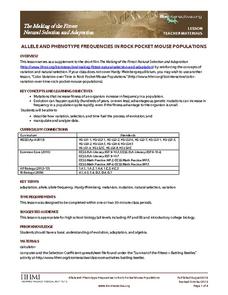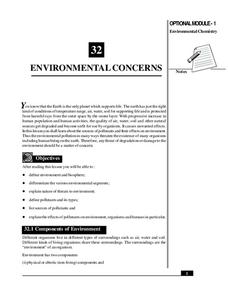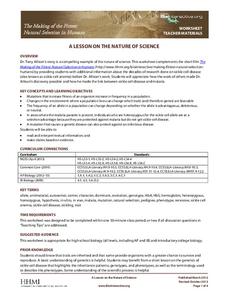NOAA
Importance of Deep-Sea Ecosystems – What Killed the Seeds?
Most drugs used today come from nature, so the discovery of new ecosystems in the deep sea is exciting from a medical perspective. Scholars develop their own bioassay to test germination rates in seeds.
NOAA
Watch the Screen!
Can a sponge cure cancer? Life science pupils visit the drugstore under the sea in the fifth lesson of six. Working groups research the topic then get hands-on experience by testing the inhibiting effects of several plant extracts on E....
PBS
Stories of Painkiller Addiction: Learning About Opioids
Feeling high is not the only side effect of abusing prescription opioids. Middle and high schoolers learn more about specific painkillers, including Fentanyl, Oxycodone, and Clonazepam, as well as their common brand names and extensive...
Howard Hughes Medical Institute
Gorongosa: Making Observations Activity
Do you have young scientists wanting to make new discoveries rather than just completing the same experiments? Young scientists use their observational skills to identify animals and patterns in animal behavior. Through tracking...
Curated OER
What Lies Beneath the Upper Crust?
Students discover if information in an article is accurate and current. In this science lesson, students read the story carefully and decide on what the subject of the article is. Students search the Internet to see more information...
Curated OER
Organization 1: Look at What I Organized!
Students recognize that organizing things can make it easier to find things later.
Curated OER
Legislative Debate: The Importance and Role of Debate within the Legislative Process
Learners learn the legislative process as they debate real-life issues that affect students within their age group. To prepare for the debate, learners consult newspapers, selected articles, case studies, and other media resources....
Curated OER
Out of This World Writing!
Miss Frizzle's class provides the inspiration for your young learners! Read "The Magic School Bus Explores Outer Space," and discuss the solar system. First learners will complete a KWL chart about a planet they're assigned to. Then, as...
Curated OER
Food Dictionary - Harvest Festival
Young scholars explore healthy foods and dictionary organization. Students create a list of healthy foods. They construct their own food dictionary, with illustrations. Young scholars model how a dictionary page should be filled with...
Curated OER
Elements of Culture
Sixth graders work in small groups to research an ancient culture using guide questions. They use note-taking and research skills, and organize their research information using a software graphic organizer program. They create a museum...
Curated OER
Introduction to the Dictionary
First graders explore how to use a dictionary. They discuss how the dictionary is organized and how to locate words in the dictionary and students use the dictionary to locate words.
Curated OER
Where Exactly Am I, Anyway?
Students are introduced to the components of an URL. They explore several websites in groups and evaluate the reliability of each. Students identify sites that they believe will provide reliable information and complete a worksheet.
National Geographic
Eat an Alien Invader
If you are looking for a lesson about invasive species to ocean habitats, you have arrived! Introduce the concept to learners and have them read an article about marine invasive species. Vocabulary, relevant web links, and a cute handout...
Howard Hughes Medical Institute
Color Variation over Time in Rock Pocket Mouse Populations
A species-specific look at natural selection, the resource herein examines how adaptations have helped the population of rock pocket mice survive in a changing landscape. To begin, middle or high schoolers watch a 10.5 minute video,...
Organic Farming
Four Seasons
Celebrate the changing of the seasons with this collection of arts and crafts activities.
Curated OER
Allele and Phenotype Frequencies in Rock Pocket Mouse Populations
In the deserts of Arizona and New Mexico, some tiny creatures show just how quickly natural selection can turn a mutation into an advantageous adaptation. Watch a video about rock pocket mice, who show that one small change can make all...
National Institute of Open Schooling
Environmental Concerns
Every year, more than 14 billion pounds of garbage is dumped into the oceans of the world, most of which is plastic and toxic to ocean life. Lesson 32 in the series of 36 focuses on environmental concerns, specifically pollution. Under...
Howard Hughes Medical Institute
A Lesson on the Nature of Science
If you are looking for a great way to present natural selection in humans, look no further. This handout is intended to accompany the 14-minute video The Making of the Fittest: Natural Selection in Humans, which can be found on the...
Curated OER
Life in the Crystal Palace
Marine biologists research sea ice communities. Assign some groups to construct paper models of sea ice communities in winter, and some to construct models of them in summer. The lesson is simplistic, but the Internet resources provided...
Florida Center for Reading Research
Comprehension: Narrative Text Structure, Story Pieces
An activity boosts reading comprehension by challenging scholars to answer questions about a narrative tale detailing elements—plot, characters, setting, theme, problem, and solution.
National Institute of Open Schooling
Biomolecules
An informative lesson has learners read about, discuss, and study the classification, structure and importance of the following biomolecules: carbohydrates, proteins, lipids, nucleic acids, and enzymes.
Curated OER
Are Adult Pancreatic Beta Cells Formed by Self-duplication or Stem Cell Differentiation?
A case-study of Dr. Melton's experiment on pancreatic cells highlights this worksheet. Details of the study adorn the first three pages, complete with diagrams. Biology buffs then analyze the data and identify problems within the...
NOAA
Deep-Sea Ecosystems – Entering the Twilight Zone
Imagine an ecosystem without any light or oxygen, where living things convert carbon dioxide into food. This ecosystem is thriving and might just be the largest ecosystem on our planet, yet we know very little about it. The lesson...
Howard Hughes Medical Institute
Building Ecological Pyramids
Looking for a fresh take on traditional food/energy pyramids? Conduct an innovative activity where pupils build their own! The lesson uses research data from Gorongosa National Park in Mozambique for a real-life safari touch. Scholars...

























